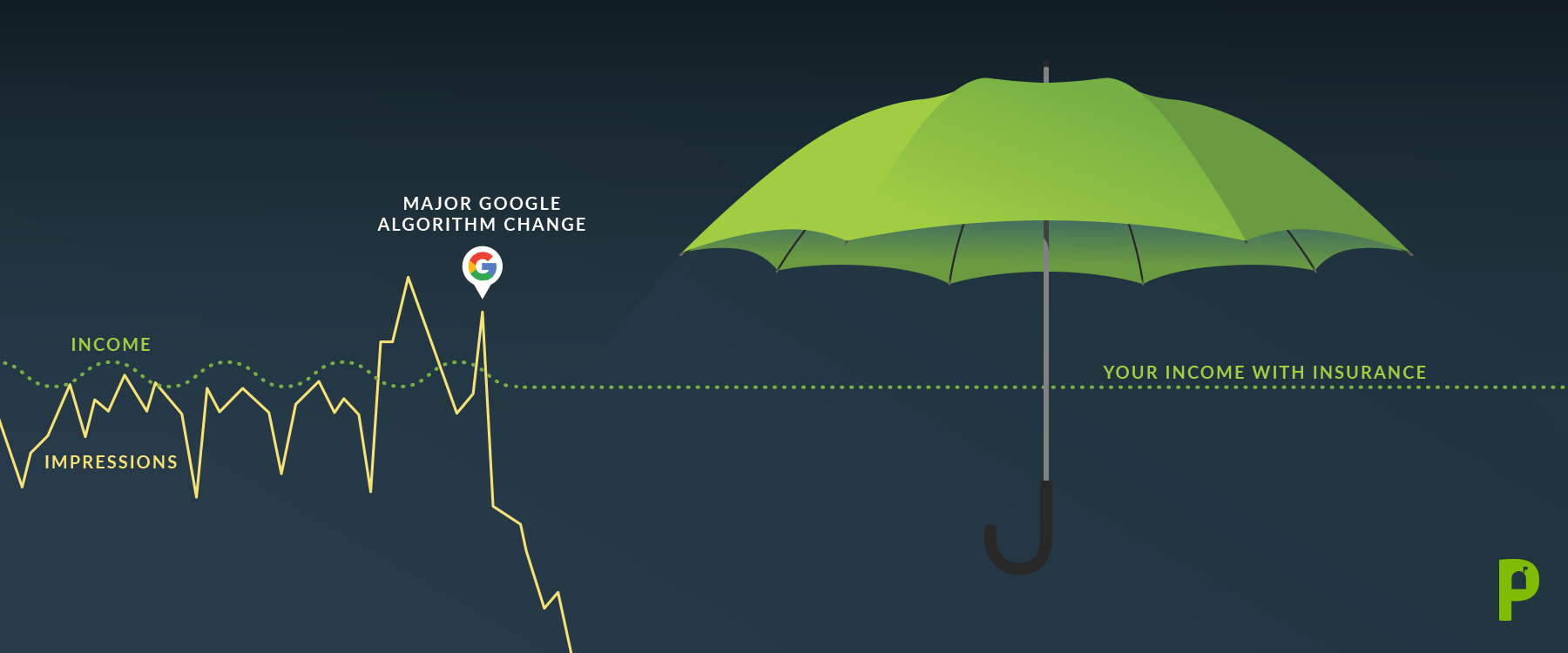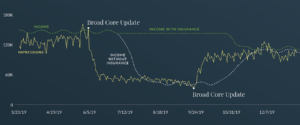Business Strategy & Development, Digital Marketing

The last time I spoke with my business insurance agent, she asked me the question, “What keeps you up at night?”
My answer will probably surprise you. As the president of a small business, there are endless possibilities. But, I’m not too worried about an office break-in, or that a team member will steal something or get hurt. Instead, I’m most fearful that a change in search engine algorithms will cause a major decline in the revenue of our clients.
Postali has been executing marketing for lawyers for over a decade, and with all the possible threats our agency could face, the number one issue is uncertainty in the way Google ranks a website after an algorithm change. What we can be certain of, however, is that there will be winners and there will be losers. And for all our clients with a history of a few years or more, they’ve experienced the highs and lows from these changes, both financially and emotionally.
As marketers, it is our job to prove to our clients which of their campaigns are generating revenue. When an algorithm update reduces the organic search rankings our client has maintained, it can be debilitating and demoralizing.
The effect? Fewer inquiries and fewer clients. Both of which will result in a reduction of revenue, greatly affecting their bottom line shortly thereafter.
For example, a client of ours has an average monthly revenue of $350,000, which deviates by 10% in any given month, give or take. They’ve built a business and a life on this range. They employ people with families, sign long term leases, and pay health insurance and benefits premiums.
Then along comes an update that changes the game.
Suddenly, search visibility falls across the board, giving way for other competitors and businesses to move ahead of them. The impact is felt immediately by lower organic traffic and conversions. And by the time the change makes it to the profit and loss statement, the outcome is devastating.
That reliable $350,000 per month average income reduces to $225,000, a business income loss of 35%.
For those of us who live in this world of digital marketing and SEO, we’ve learned to live with this uncertainty as part of working in the business. You have ups and downs, you work through them, you keep getting better. But for the end user, it can be too much to bear.
Once the financial worry sets in, marketers have to respond to their clients, and they hear things like:
- “We have to keep doing more work, and this will all get better.”
- “Your prior marketing company did X, that caused the problem.”
- “You need much better content.”
- “Your link profile is not good enough.”
But in an honest moment, an SEO expert also knows that sometimes there isn’t a reason that can be understood quickly enough to act on, AND act on before the next update to truly know whether such actions were effective.
Your marketers are supposed to be staying up-to-date on best practices and webmaster guidelines. But, even when you follow the rules, an algorithm update can wipe out your rankings and your income.
In the search engine marketing community, it is well known that updates can “over-correct.” While corrective action is sometimes needed, it’s also possible that the site will only be impacted for a few weeks or months, and in the meantime, you’re stuck holding the bag.
To me, this is all sounds like the making of a great and new insurance product, Algorithm Insurance – one that can help business owners and the agencies that work on their behalf. There’s insurance for just about everything outside of your control. If the power goes out, your business gets paid daily until it is back on. If you are sued for your own error or negligence, your legal defense and claims against you are paid.
So, is there enough actuarial data and business interest in an insurance product that would cover algorithm updates and their corresponding outcomes? I think, yes.
There are numerous updates to Google’s algorithm all year long. In fact, Google announced that in 2018 alone, they made 3,234 improvements to Search. But, it’s a small handful of improvements, what they call their Broad Core Algorithm updates, that cause a great deal of risk for a business.
Here are the broad core and major algorithm updates from 2019:
- March 12, 2019 (Broad Core Algorithm Update)
- June 2, 2019 (Broad Core Algorithm Update)
- September 24, 2019 (Broad Core Algorithm Update)
- October 25, 2019 (BERT Update)
When you overlay the algorithm updates for our client that lost 35% of its business in the middle of the year, it doesn’t take too much analysis to see that at the beginning of June, immediately following the release of the update, search impressions (or search visibility) were cut in half. The slowdown was not gradual as per the usual ebbs and flows of business, but that of an axe, chopping their visibility in half without mercy.
This client who went from $350,000 per month to $225,000 per month was able to endure this downturn for two months before starting the termination of employees and cutting back on investments and commitments. Fortunately, another update was released toward the end of September, which sent visibility back up, with a nearly full restoration to the norm.
But, how long can an average business survive with these circumstances? When a downturn like this occurs, it takes a lot of fact-finding and work to course correct. A new campaign or strategy is costly at the worst time and your patience is tested as you wait for results (or maybe even the next update) to bring you back to where you were.
If you’ve been on the wrong side of an algorithm update, you might have already experienced first-hand how insurance would have been useful for you or your clients. If this client could have purchased an insurance policy that would have buffered their losses, I think they would have definitely done so.
Even though we only work with law firms, I would suspect many types of businesses that rely on organic visibility as a major component of their business income would be interested as well. Surely, the endlessly creative insurance industry that covers all types of unforeseen events could formulate a premium and terms that would protect business owners and their bottom lines.
All of the underpinnings of this offering are already in existence for other insurance products. Loss of business income insurance is a common rider on commercial policies. The point being, is that if an insurance company can fill in the income gap caused by an unexpected event, your business won’t implode because of it. You get to select from a menu of limits and options that make you feel comfortable with the risk your business faces.
With a combination of covering actual income loss up to an agreed limit, an elimination period (the time before the insurance kicks in), and a period of restoration (how long will the insurance pay before it will stop), plus paying for experts to assess and mitigate the damage, a business would be in a much better position to weather the storm.
This whole concept of insurance for the downside might sound a little farfetched to us marketers who live in this up and down reality and don’t deal with insurance very often. But, it already exists in so many flavors of insurance and finance products.
It would be perfectly reasonable to wonder; how could this ever work? I think the same rules and methods that exist for insurance and finance products, business policies, life insurance policies, and wealth protection would apply to algorithm insurance.
Just like an insurance appraiser who is dispatched to capture the current state of your business and its property, the same would be true here. Data about your business’s website, such as the content, your site’s performance, and which websites are linking to yours can be stored in a snapshot at the time of the activation and periodically updated. Just the same, your historical business financials can be analyzed by underwriters and claims adjusters to identify both your average income and the effects to it after a catastrophic event. After all, we don’t know when and where a hurricane might hit your building, but we know they happen every year, to some locations more than others, and only the bravest of the brave would go without adequate coverage.
I am not advocating for or saying that a business should not be responsible for the normal inclines and declines of their visibility from the work they are performing, or lack thereof, to their website. We should all move up and down based on the quality of our work and the experience it provides to the end-user, which is supposed to be reflected by Google’s iterative “improvements” to its search result pages. But, when there is a change in an algorithm that moves your site and your income drastically, you need a safety net. Insurance companies would be able to capture enough historical information about your website, your business, and its marketing practices to determine a baseline of where you are, just like taking a picture of your dwelling and belongings.
There’s no doubt, mature businesses are used to the changing tides of organic search visibility by now. Without insurance protection, they are holding onto more cash than necessary, making fewer investments in their business growth, and are always living with the fear of the next update. I know without hesitation, that if I could buffer the income risk from these events, I certainly would. Then the next time I speak with my insurance agent, the elephant in the room won’t be their inability to cover our greatest need. We’d be back to talking about how the business is doing and the weather, a change I would welcome, and I know my clients would too.

Not sure where to begin?
Get started with a marketing audit.

